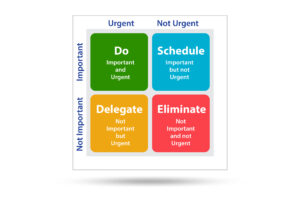Two of my clients’ biggest challenges, particularly business owners, are time management and improving productivity. When you feel busy all day long, it can take time to pinpoint the sources of lost time in your schedule. If that sounds like you, the Eisenhower Decision Matrix might be the secret to controlling your time management.
What Is the Eisenhower Matrix?
The Eisenhower Decision Matrix is a tool that can help you prioritize tasks. It was named after former president Dwight D. Eisenhower, who once said: “I have two kinds of problems: the urgent and the important. The urgent are not important, and the important are never urgent.”
The matrix was made famous by author Steven Covey in his book The 7 Habits of Highly Effective People. It is divided into four quadrants: urgent and important, urgent but not important, not urgent but important, and not urgent and not important.
I’ve prepared a downloadable version of the matrix to help you through this exercise. By plugging your daily or weekly to-do list into the four quadrants, you can grasp where the bulk of your time should be spent during your work week.
The Eisenhower Method of Time Management
The four quadrants of the Eisenhower Decision Matrix can be broken down as follows:
- Important and urgent: These are crucial tasks with deadlines, crises, and other issues that must be resolved immediately.
- Important but not urgent: These tasks might be longer-term projects, planning for the future, strategizing, personal growth, continuing education, and other tasks that can be done later.
- Urgent but not important: These are usually interruptions—calls, emails, drop-ins, and even some meetings. They often pop up because someone on your team needs an answer for a task that might be urgent and important to them but is not an emergency for you.
- Not urgent and not important: In the last quadrant are either frivolous tasks that you may enjoy but don’t add value to your company or busy work tasks that would be best delegated to someone else or abandoned altogether.
Using my downloadable Eisenhower Decision Matrix template, organize your tasks into these four quadrants. After that, prioritization becomes much more manageable.
First, please take care of the items that are important and urgent. Those should be your top priorities each day. Next on the list are the important but not urgent items. Could you work those in when you can, but make time for them before they become urgent?
For the items that are urgent but not important in the Eisenhower Decision Matrix, ask yourself if you’re the best person to handle these tasks. Then, delegate what you can to free up space for the things that matter. For example, block off your time to avoid interruptions whenever possible,e and let your team know you will only be responding to emails and calls during specific windows of the day.
Finally, the items that are not important and not urgent are usually a waste of time. It’s rarely worth spending your energy on these when you’re paid for your high-level work. So, could you evaluate whether these tasks need to be done and find someone else to do them?
Want more great productivity tips like the Eisenhower method? I publish weekly articles about time management, leadership, and much more. Sign up for my email list to deliver each new article straight to your inbox.
Coach Dave
- What Entrepreneurs Need to Know About the Blue Ocean Strategy - January 22, 2026
- Award-Winning Time Management Tips for Entrepreneurs - January 15, 2026
- Duties and Responsibilities of a CEO - January 8, 2026



